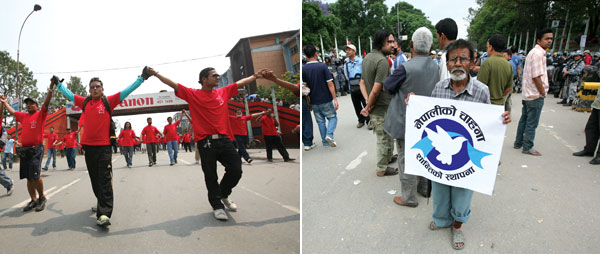 KIRAN PANDAY |
Of course, on the whole, the Peace Assemblers were better-off than the May Dayers, even if white tends to accentuate cleanliness. But the May Dayers were as motley a crew as the Peace Assemblers as far as motivation and attitudes to each other were concerned. Many media commentators understood as much, and chose not to fall wholesale for Dahal's crude demagoguery. But certain commentators of the sukilo-mukilo variety took it upon themselves to use this alleged divide for their own ends.
Shradha Ghale's 'All too predictable', published in The Kathmandu Post two days after Dahal delivered his tirade against the media and the sukilo-mukilo, was a case in point. No doubt many May Dayers came of their own accord in the hope of contributing to peace and prosperity, and Kathmandu residents would do well to appreciate this. But to present the May Dayers, en masse, as poverty-stricken, noble revolutionaries in polar opposition to prosperous, self-centred, patronising elites is unforgivable.
I cannot understand why Ghale cannot even bring herself to accept that the majority of those who assembled in Basantapur did so for a peaceful intent, and feels compelled by the force of her own rhetoric to apostrophise the event as a 'peace rally'. She deliberately ignores the fact that comedian Madan Krishna not only noted the presence at the assembly of educated professionals, but also welcomed farmers and workers. Worst of all, Ghale quotes Madan Krishna as saying "You are the respectable, intelligent and law-abiding section of this society. You shape the destinies of simple, ordinary folks. Aren't you the ones most entitled to have your say?" Either I was deafened by the chorus of peace, or Ghale is indulging in some all too predictable, liberal translation.
Undoubtedly the May Dayers were 'the people', as she notes. But isn't everybody? Since when has it been a crime to be sukilo-mukilo when this is what everybody in the country aspires to be, not least Dahal of the 'glistening, bulging' jowls? Is it possible that certain elites, stung by the charge of elitism, feel obliged not only to chastise wholesale their fellow denizens, but also imply they are vigilantes and troublemakers? But then this is only one of the many perversions that have come about when everyone treats the Maoists as if they are wild animals. We'll tolerate it if they growl at us, as long as they don't bite. It should be merely laughable when Maoist leader Dinanath Sharma claims his right to (violently) enforce peaceful protests is infringed upon. It should be absurd for those operating outside of the remit of the law � not by holding protests but by enforcing them through threats, beatings and vandalism � to actually use the term 'vigilante' in reference to those who dared defy the banda. Peaceful the banda may have seemed for the UN convoys that were waved through, and the minions of human rights observers who were well-received by those on the streets. But it certainly wasn't for those daily wage labourers who presumed to work, those who attempted to open shop, or members of the press and public who decided to chance their luck by exercising their freedom of movement (presumably more fundamental than the freedom to protest).
The perversion continued when you heard some sukilo-mukilos implying that those who defied the banda were, if not vigilantes planted by the government, at the very least foolish people provoking the cadre. To get to the point where you defend the right to enforce bandas speaks of a warped morality that can only be the result of wallowing in the paradox of liberal arts lefty sympathies, guilt at being part of Kathmandu's elite, and the inability to actually do anything to change things. Ergo, self-flagellation.
So what if people chanted against Dahal? If the Maoist chairman can threaten specific segments of society on a regular basis (never mind promising massacres that would have him swimming in blood), then in the interests of peace, the rest of us go to great pains to avoid offending him and his cadre. To listen to some self-flagellators in Kathmandu, you'd think the YCL deserved a medal for not beating to a pulp, on occasion, those who dared to (for the most part non-violently) defy them. And since everyone self-censored and even 'volunteered' donations, you'd think extortion didn't take place. Think again.
Everyone knows one-sided broadsides are more exciting, but do they really open up new perspectives or ultimately undermine themselves? It's possible (and permissible) to be anti-Maoist and pro-people. Go figure that out, dichotomists of the world.
READ ALSO:Running on empty
The Buddha's message, Publisher's note
Don't kill the CA, Gagan Thapa
The PLA speaks, Ekal Silwal
Online incline, CK Lal
War games, Prashant Jha



